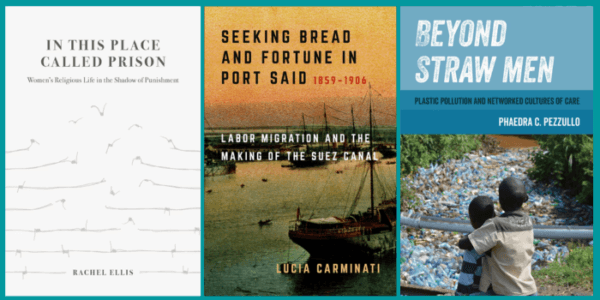"Accessible and well-written, In This Place Called Prison will engage not only students of sociology and carceral studies, but scholars of lived religion, gender and sexuality, and political theology, as well."
— Political Theology Journal
"This is an excellent book that is easily accessible, thought provoking, and sheds light on an important, but under studied, topic."
— Review of Religious Research
"Ellis switches brilliantly between major structural analysis that contextualizes and personal stories that tell the cases of particular women. She is indeed interested most of all in the personal transformation that incarcerated women undergo and in the role that religion can play here."
— Journal of Contemporary Religion
"By showing how religion in prison is both a resource and a power, as well as a source of power and control, Ellis makes an original and relevant contribution to debates in the sociology of religion and prison sociology."
— Sociology of Religion
"This book is a welcome addition to the interdisciplinary study of the law, and it would make a powerful contribution to conversations in sociology, philosophy, ethics, political science, religion, and gender studies classrooms—as well as to scholarly research agendas."
— Law, Culture and the Humanities
"Ellis is a skilled and empathetic ethnographer. . .The women about whom she writes are complex people navigating a world of very limited choices."
— Law & Society Review
“In This Place Called Prison: Women’s Religious Life in the Shadow of Punishment is an ethnographic account of religious life in a women’s prison, pseudonymously called Mapleside, on the east coast of the United States. Through interviews with Protestant, Catholic, Muslim, and Jewish incarcerated women; religious program volunteers; and prison staff and chaplains, sociologist Rachel Ellis investigates how religion offers incarcerated women tools both to resist and yield to carceral power.”
— American Religion
"This is sociology at its best: counterintuitive, theoretically rigorous, methodologically sound, substantively important, and beautifully written. For scholars and researchers interested in the latent functions that seemingly benign institutions play in the domination of vulnerable populations, I cannot recommend Rachel Ellis's In This Place Called Prison more enthusiastically."—Sandra Susan Smith, Daniel and Florence Guggenheim Professor of Criminal Justice, Harvard Kennedy School
"Few works expose the core of America's complex religion of punishment and patriarchy better than this remarkable book. It is a revelation, a reckoning, and hopefully a Road to Damascus moment for the field."—Shadd Maruna, author of Making Good: How Ex-Convicts Reform and Rebuild Their Lives
"Through deft storytelling and sensitive ethnography, Ellis unravels the symbiosis of two quintessentially American institutions—prison and Christianity. Through the eyes of women behind bars, we witness religion's counterintuitive power to ease but also exacerbate the pains of imprisonment."—Forrest Stuart, author of Down, Out, and Under Arrest: Policing and Everyday Life in Skid Row
"In This Place Called Prison adds a much-needed carceral ethnography to the dearth of scholarship on women's prisons and offers powerful new insights into the role of religion in incarcerated women's lives. A beautifully written and important work."—Jody Miller, author of Getting Played: African American Girls, Urban Inequality, and Gendered Violence
"Ellis's book is a timely and important contribution to the growing body of ethnographic literature on the societal effect of mass incarceration. This gripping and well-written account provides a fresh perspective not only on the understudied demographic of women in prison but also on how imprisonment takes a brutal and unrecognized toll on women, the rest of their families, and their religious lives."—Elijah Anderson, author of Code of the Street: Decency, Violence, and the Moral Life of the Inner City



